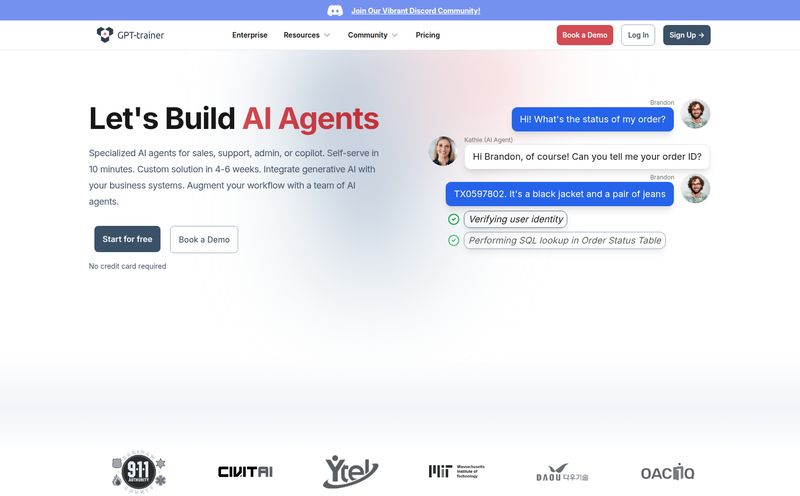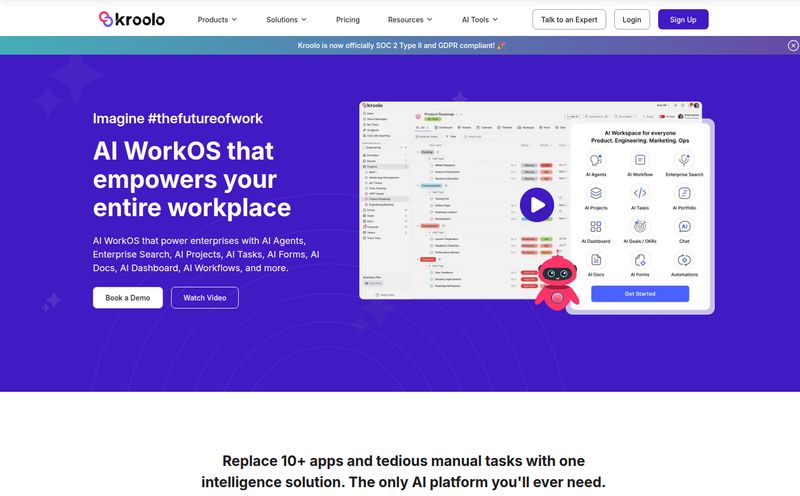I’ve been in the SEO and digital marketing game for years, and if there’s one thing I’ve seen a million times, it’s the promise of a “revolutionary” new tool. Most of the time, it’s just a new coat of paint on an old idea. But every now and then, something pops up that makes you tilt your head and go, “Huh. Okay, that’s… different.” That was my reaction when I stumbled upon Mixus.
We all know the drill. You’re in a group chat—Slack, Teams, Discord, whatever your flavor—and you’re trying to brainstorm. It's a chaotic mess of notifications, half-baked ideas, and that one person who only communicates in GIFs. On the other side, you have AI chatbots. They're brilliant, fast, and can write a sonnet about your cat in 2.5 seconds. But they're a solo act. It's just you and the machine, and you miss that human spark, the unexpected left turn a teammate’s weird idea can provide.
So, what if you could smash those two worlds together? What if you could have a brainstorming session with your team and an AI, all contributing in the same space, at the same time? That’s the big, audacious idea behind Mixus.
So, What Exactly is Mixus? Let’s Talk “Co-Intelligence”
At its core, Mixus is a platform built for multiplayer AI chat. That’s the fancy term for it. The simpler way to put it is: it's a chatroom where humans and AI work together. They call this concept “co-intelligence,” and I have to admit, the term has a nice ring to it. It’s not just artificial intelligence; it’s collaborative intelligence.
Think of it like a roundtable discussion. You've got your project manager, your creative lead, your data analyst, and then there's this new team member, the AI. It’s not just a tool you poke for answers; it's an active participant. It can offer ideas, synthesize information from the chat, or play devil's advocate, all while the humans in the room build on, critique, and refine its contributions in real time.
When you land on their site, it’s… well, it’s minimalist. Almost secretive. There’s not a lot of marketing fluff. One of the first things you might see is the phrase: “The new Turing test.” That's a pretty bold statement, basically comparing their platform to the ultimate test of a machine's ability to exhibit human-like intelligence. It tells me they’re not just building a handy-dandy chatbot plugin; they’re aiming for something much bigger.

Visit mixus
The Core Experience: How Multiplayer AI Chat Actually Feels
So, how does this all work in practice? From what I can gather, you sign up and join a session. Inside, the interface is a chat. But instead of a two-way street between you and an AI, it’s a multi-lane highway of ideas. You can throw out a prompt like, “Okay team, we need a Q3 marketing campaign slogan for a new brand of eco-friendly coffee.”
Immediately, your teammate Jane might suggest something. The AI might instantly generate five different slogans based on the prompt. You might then ask the AI to combine its best idea with Jane’s concept. Another teammate, Bob, might point out a flaw in the AI's logic, and the conversation pivots. It’s a dynamic, living document of a brainstorm.
This is what they mean by human intelligence integration. The AI isn’t the hero of the story. It’s a powerful supporting character, and its performance is elevated by the humans around it, and vice-versa. This could be a game-changer for solving complex problems that require both the raw processing power of a machine and the nuanced, contextual understanding of a human being.
The Good, The Bad, and The Intriguing
Like any new piece of tech, it’s not a magic wand. There are some brilliant aspects to this idea, and some practical hurdles to consider. Let's get real about it.
The Upside of a Shared Brain
The real magic, in my opinion, lies in the synergy. One of the biggest complaints about AI is its tendency to “hallucinate” or just make stuff up. In a solo chat, you have to be the fact-checker. In a Mixus environment, you have multiple human brains ready to instantly call foul or, even better, steer the AI’s mistake into a more interesting, correct direction. The potential for rapid iteration is massive.
This platform seems custom-built for knowledge sharing. Imagine onboarding a new employee by having them join a session with a senior team member and an AI trained on your company's internal documentation. It’s a living, interactive FAQ. That’s pretty cool.
Some Potential Roadblocks and Realities
Okay, it can't all be perfect. First off, and this is a pet peeve of mine, you have to create an account. I know, I know, it's a small thing, but another login and password to remember is always a tiny bit of a drag. A necessary evil, I suppose.
The bigger issue is that the platform's effectiveness is completely dependent on other people. What if you're fired up and ready to solve a problem at 10 PM, but your team has logged off for the day? The multiplayer aspect becomes a single-player game, and then it’s just you and an AI again. The tool is only as powerful as the active participation of its users.
And finally, the whole experience hinges on quality. A truly collaborative session needs a sharp, responsive AI and engaged, intelligent human contributors. If the AI is laggy or unhelpful, or if a human participant is disengaged, the whole co-intelligence concept starts to fall apart. It's a delicate balance.
What About The Price Tag?
So, how much will access to this collaborative mind-meld set you back? That’s the million-dollar question, isn't it?
As of writing this, Mixus is playing its cards very close to its chest. There is no public pricing page or information available. This could mean a few things. They might be in a beta phase, offering access to select teams. They could be figuring out a model that makes sense—maybe a freemium offering for small groups and an enterprise plan for larger companies. For a tool like this, I could easily see a per-seat pricing structure, similar to other SaaS collaboration platforms.
For now, we'll have to wait and see. The lack of a price tag adds to the mystery, but it's also a practical barrier for teams looking to budget for new tools right now.
Who Is Mixus Actually For?
I don't think this is a tool for everyone. If you just need an AI to write an email or summarize a document, your standard chatbot is probably fine. Mixus seems designed for a specific kind of work.
I can see this being incredibly useful for:
- Creative Agencies: Brainstorming ad campaigns, taglines, and brand strategies.
- Product Teams: Hashing out new features, user flows, and solving complex UX problems.
- Content Strategists: Developing topic clusters and content calendars with real-time SEO feedback from an AI.
- Development Teams: Collaborative coding or debugging sessions where an AI can suggest snippets and check for errors.
Essentially, any team that relies on collaborative brainstorming to do its best work could find a powerful ally in Mixus. It's for groups that need to move past simple Q&A and into genuine, co-creative problem-solving.
Frequently Asked Questions about Mixus
How is Mixus different from just adding a bot to a Slack channel?
The key difference is the integration. Most Slack bots are command-based; you have to call them with `/` or `@`. Mixus is designed for a more fluid, conversational environment where the AI is an equal participant, contributing proactively to the flow of the discussion rather than just responding to prompts.
Is Mixus free to use?
Currently, there is no public information on the pricing for Mixus. They don't have a pricing page on their website, which suggests they may be in a private beta or still finalizing their business model.
What kind of AI does Mixus use?
The company hasn't specified the exact Large Language Model (LLM) they are using. However, their reference to being a “new Turing test” suggests they are confident in its conversational and reasoning capabilities, putting it in the same league as other top-tier AI models.
Do I need a team to use Mixus?
While you could technically use it alone with the AI, the core concept is “multiplayer.” You’ll get the most value from Mixus when using it with at least one other human collaborator to leverage the platform's co-intelligence features.
What is “co-intelligence” again?
Co-intelligence is the term Mixus uses to describe the synergy created when human intelligence and artificial intelligence collaborate in real time. It's the idea that the combination of both is more powerful than either one working alone.
Is my data private in a multiplayer chat?
This is a critical question for any team-based tool. While Mixus doesn't provide a detailed public privacy policy yet, any team considering it for sensitive work should definitely reach out to them via their contact page to clarify their data handling and privacy protocols.
My Final Thoughts
Mixus is one of the more interesting ideas I've seen in the AI space recently. It’s an ambitious swing for the fences. It's not just another AI wrapper; it's a genuine attempt to change the way we interact with AI, turning it from a solo tool into a team sport.
Of course, it faces hurdles. Adoption, user engagement, and the raw quality of the tech will determine its fate. But the concept? The concept is solid gold. In a world saturated with AI tools that often feel isolating, a platform designed from the ground up for collaboration is a breath of fresh air.
I'm genuinely excited to see how this develops. Will it become the new standard for remote brainstorming, or will it be a fascinating niche product? I don't know yet, but for the first time in a while, I’m eager to find out. I’ll definitely be keeping an eye on this one.



